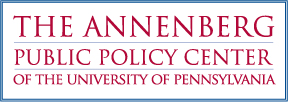
Presidential debates matter. Voters learn about presidential candidates and their stances on issues from debates and subsequent news coverage. Now, in a new collaboration, the Internet Archive and the Annenberg Public Policy Center aim to help journalists and the public better understand how television news shows present what happens in the debates in post-debate TV coverage. This includes which exchanges between the candidates get replayed on TV – and which do not get coverage – and how this affects public knowledge about issues from health care to immigration.
New collaboration to help journalists and public see how TV covers debates
In joining forces, the Internet Archive brings technical expertise in archiving and computer-assisted analysis of TV news content, while the Annenberg Public Policy Center of the University of Pennsylvania brings decades of experience in public-opinion surveys and communication scholarship on presidential debates.
Television remains one of the main conduits through which voters view and learn from the debates. More than 46 million households watched the first 2012 general-election debate between incumbent Democratic President Barack Obama and Republican challenger Mitt Romney on television. And a 2014 survey by the Annenberg Public Policy Center found that a plurality of 29 percent of voters found the debates more helpful in deciding how to vote than a range of other options, including news coverage, social media discussions, political talk shows and broadcast interviews with the candidates. (See a white paper with the survey here.)

The Annenberg Public Policy Center (APPC) will integrate information on TV news coverage of the debates from the Internet Archive into research surveys. Both the post-debate coverage on broadcast and cable channels as well as the morning-after coverage on talk shows will be used to better understand how television covers the debates and what voters learn from the coverage of issues such as the economy, healthcare, immigration, and education. The surveys will be directed by APPC director Kathleen Hall Jamieson and managed by Ken Winneg, APPC’s managing director of survey research.
In addition, the Internet Archive will:
- Provide researchers and others with near real-time access to shareable video of debates. The Internet Archive will make available a free online archive of the televised debate that is searchable, using closed-captioning. The segments will be available to national fact-checking partners on the Internet Archive’s Political TV Ad Archive project.
- Analyze how TV news shows report on debates. Using the Duplitron, the open source audio fingerprint technology that fuels the Political TV Ad Archive project, the Internet Archive will analyze which video segments national broadcast and cable news shows choose to highlight in their post-debate reports. The Internet Archive will also analyze local TV broadcast coverage in key TV markets in battleground states. The Duplitron was created by Dan Schultz, senior creative technologist for the TV News Archive.
Contacts:
Michael Rozansky, APPC, michael.rozansky@appc.upenn.edu, 215.746.0202
Nancy Watzman, Internet Archive, nancyw@archive.org, 303.514.0888
